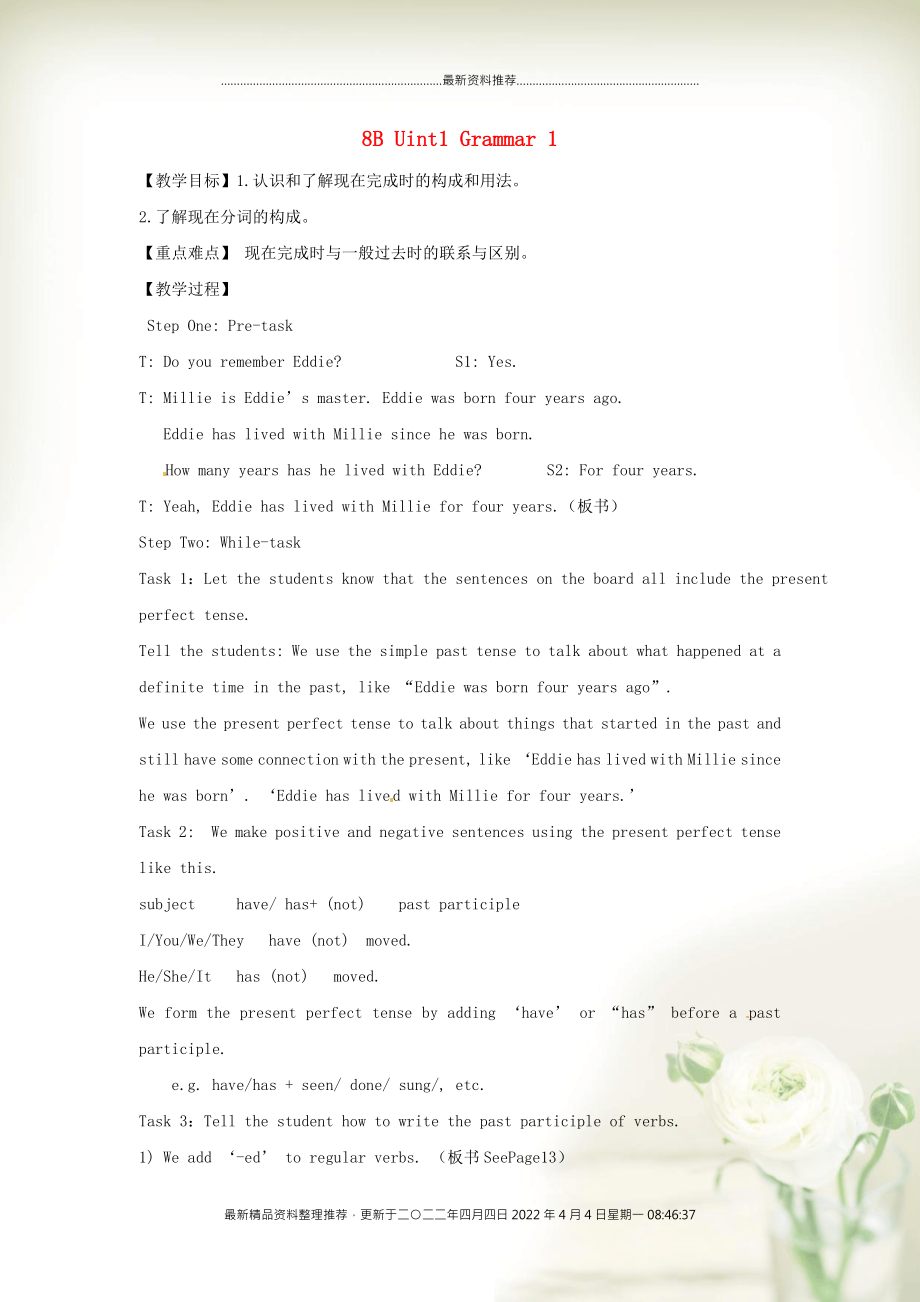《八年級(jí)英語(yǔ)下冊(cè) Unit 1 Past and present Grammar 1教案一 牛津版》由會(huì)員分享,可在線(xiàn)閱讀��,更多相關(guān)《八年級(jí)英語(yǔ)下冊(cè) Unit 1 Past and present Grammar 1教案一 牛津版(3頁(yè)珍藏版)》請(qǐng)?jiān)谘b配圖網(wǎng)上搜索��。
1、最新資料推薦8B Uint1 Grammar 1【教學(xué)目標(biāo)】1.認(rèn)識(shí)和了解現(xiàn)在完成時(shí)的構(gòu)成和用法��。2.了解現(xiàn)在分詞的構(gòu)成��?�!局攸c(diǎn)難點(diǎn)】 現(xiàn)在完成時(shí)與一般過(guò)去時(shí)的聯(lián)系與區(qū)別?�!窘虒W(xué)過(guò)程】 Step One: Pre-task T: Do you remember Eddie? S1: Yes.T: Millie is Eddies master. Eddie was born four years ago. Eddie has lived with Millie since he was born. How many years has he lived with Eddie? S2: For
2��、four years.T: Yeah, Eddie has lived with Millie for four years.(板書(shū))Step Two: While-taskTask 1:Let the students know that the sentences on the board all include the present perfect tense. Tell the students: We use the simple past tense to talk about what happened at a definite time in the past, like
3��、“Eddie was born four years ago”. We use the present perfect tense to talk about things that started in the past and still have some connection with the present, like Eddie has lived with Millie since he was born. Eddie has lived with Millie for four years.Task 2: We make positive and negative senten
4��、ces using the present perfect tense like this.subject have/ has+ (not) past participle I/You/We/They have (not) moved. He/She/It has (not) moved. We form the present perfect tense by adding have or “has” before a past participle. e.g. have/has + seen/ done/ sung/, etc.Task 3:Tell the student how to
5、write the past participle of verbs.1) We add -ed to regular verbs. (板書(shū)SeePage13) 2) We form the irregular verbs differently. We do not add -ed. Ask the students to look at the table of irregular verbs on Page 121. Ask the students to remember the past participle of irregular verbs.Task4 (A1):Here is
6��、 a short exercise for students to finish. Ask the students to complete the table with the correct past participle on page 10. And then work out the rule.Task 5 (A2):After the short exercise, ask the students to complete the sentences using the present perfect. Help them to complete. Ask them not to
7、forget the verb have/ has. Present the Present perfect tense briefly. Subject + have/has+ past participleTask 6 :Teach the students how to ask and answer questions using the present perfect tense. e.g. Have you arrived? Yes, I have. / No, I havent. Has she left? Yes, she has. / No, she hasnt.(板書(shū))The
8��、 teacher asks the students some more questions.Task7 Chat time (A3) :Millie and Sandy are talking about a film about Hong Kong. Complete their conversation using the correct forms of the verbs in brackets. 1) Give them several minutes to complete it. 2) Check the answers with the whole class. 3) Ask
9��、 some pairs to act out the conversation.Step Three: Post-task I. 分清一般過(guò)去時(shí)與現(xiàn)在完成時(shí)I cleaned the blackboard half an hour ago (只說(shuō)明“擦”和其發(fā)生的時(shí)間)I have cleaned the blackboard. (說(shuō)明現(xiàn)在黑板是干凈的)總結(jié):(1)一般過(guò)去時(shí)只表示過(guò)去的動(dòng)作或狀態(tài), 和現(xiàn)在不發(fā)生關(guān)系。(強(qiáng)調(diào)動(dòng)作發(fā)生的時(shí)間) 現(xiàn)在完成時(shí)表示過(guò)去發(fā)生的某一動(dòng)作 對(duì)現(xiàn)在造成的影響,強(qiáng)調(diào)的是現(xiàn)在��。(側(cè)重動(dòng)作的結(jié)果)2.T or FThe train has arrived just
10��、now. The train has just arrived. She has returned from Paris yesterday. She has returned from Paris.總結(jié): (2)一般過(guò)去時(shí)常與表示過(guò)去的時(shí)間狀語(yǔ)連用,如:yesterday, last year, three days ago, just now,等。 現(xiàn)在完成時(shí)不能和表示過(guò)去的時(shí)間狀語(yǔ)連用,其時(shí)間狀語(yǔ)往往是since,for, just, ever, never, before, already, yet , so far等或無(wú)時(shí)間狀語(yǔ)��。 3. Fill in the blanks.1.:
11��、I _(lose) my pen. Can you lend me yours? : Why dont you buy one?: It _(fall) into the river only a moment ago when I washed my hands. Now Ive got to fill in a form with a pen. 2. A: -When did you lose your cat? B: -I _(lose) it last night. A: -Where did you find it? B: -I _(find) it the garden.總結(jié): 如果詢(xún)問(wèn)某事發(fā)生的時(shí)間��,地點(diǎn)只用一般過(guò)去時(shí)��。Step Four Homework最新精品資料整理推薦��,更新于二二二年四月四日2022年4月4日星期一08:46:37
 八年級(jí)英語(yǔ)下冊(cè) Unit 1 Past and present Grammar 1教案一 牛津版
八年級(jí)英語(yǔ)下冊(cè) Unit 1 Past and present Grammar 1教案一 牛津版

